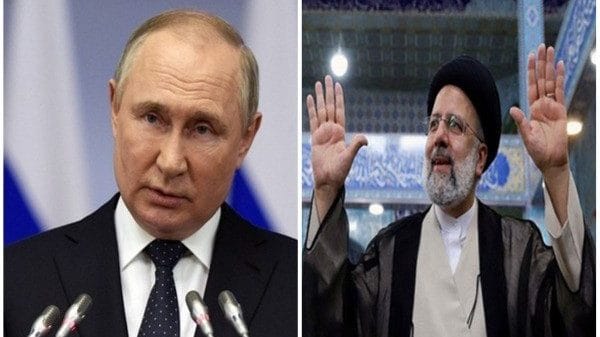The US attack on three Iranian nuclear sites marks a direct intervention in the Israel-Iran war, pushing an already fragile West Asia deeper into crisis. Washington sees the China-Russia-Iran-North Korea axis as a major threat to its regional and global interests. Moscow’s response to this rapidly evolving conflict now holds major implications for regional stability.
After Israel’s ‘Operation Rising Lion’—a large-scale airstrike on Iran’s nuclear facilities and top military leadership—Russia offered to mediate between the two sides to de-escalate tensions.
But the US attack has complicated Russia’s balancing act.
Russia’s first move: Condemnation, calls for diplomacy
President Vladimir Putin held separate calls with Iranian President Masoud Pezeshkian, Israeli Prime Minister Benjamin Netanyahu, and US President Donald Trump. Moscow swiftly condemned the Israeli operation, citing violations of international law and the UN Charter. Putin’s spokesperson, Dmitry Peskov, called the strikes “unprovoked” and warned of conflict escalating at a “galloping” pace. Russia also blamed Israel for derailing already-stalled negotiations between Tehran and Washington.
Putin reiterated that Iran’s nuclear aspirations must be addressed diplomatically, and suggested Russia could help develop a peaceful programme that addresses Israel’s security concerns.
These remarks reflect Russia’s broader geopolitical aim of positioning itself as a responsible global power and regional stabiliser, contradicting the US and Western depiction of Russia as the aggressor in Ukraine. Moscow has stood its ground to assert NATO’s eastward expansion and insensitivity of the Western powers towards Russia’s security concerns as the reason for the Russia-Ukraine war, which is now in its fourth year.
Also read: Will Russia & China back Iran after US strikes? They’re quiet, calculating allies
Russia’s strategic opportunity or diplomatic dilemma?
Russia’s reputation as a regional power in West Asia was shaken after the fall of Syrian President Bashar al-Assad in 2024, despite its support for his regime since 2015. The Israel-Iran conflict gave the Kremlin an opportunity to reassert itself as a key player through high-level engagement with all the actors, including Washington.
This scenario brought back memories of post-9/11 cooperation, when Russia provided the US overflight and transit rights for its war in Afghanistan in 2001. But US-Russia ties today remain deeply strained, despite the personal rapport between Trump and Putin.
With Iran, Russia is facing a diplomatic dilemma given their close bilateral ties. Moscow and Tehran signed a comprehensive 20-year strategic partnership treaty in January. While the agreement lacks a joint military clause akin to NATO’s Article 5, Tehran might now expect tangible support from Moscow.
So far, Russia hasn’t committed military assistance and has only sent out strong rhetoric against Israel and the US. The Iranian leadership, under immense pressure, may view rhetorical support as insufficient, considering how it backed Russia during the Ukraine war by providing Shahed combat drones and assistive technology.
Also read: Iran’s Khamenei sends foreign minister to Moscow to ask Putin for more help after US strikes
Nuclear speculation and regional fallout
On 22 June, former Russian President Dmitry Medvedev stirred controversy by claiming that several nuclear-armed states might supply Tehran with nuclear warheads. Although he did not name the countries, speculation points toward North Korea and Pakistan—not Russia. But given Russia’s nuclear arsenal—estimated at 4,380 warheads as per the SIPRI 2024 report—Iran may hope for more decisive backing from Moscow.
Russia’s cautious stance likely stems from multiple considerations.
Any military support to Iran could jeopardise Moscow’s working ties with Tel Aviv and Washington. Moreover, Russia’s Ukraine war has already stretched Moscow militarily and diplomatically. Escalating involvement in a West Asian war could further strain its resources and political bandwidth.
The situation places Putin in a difficult position. Should Israel and the US succeed in delivering a decisive blow to Iran, it could undermine Russian credibility. On the other hand, visible hesitation to support Tehran may strain the Russia–Iran alliance, especially given Iran’s past military aid to Russia.
From the Kremlin’s perspective, the Pentagon’s involvement in the Israel–Iran conflict also raises the spectre of a regime change agenda—a scenario that evokes long-standing Russian anxieties about Western interventions. This is viewed in a similar light as NATO’s expansion into what Russia considers its sphere of influence.
Iran’s Foreign Minister landed in Moscow on 23 June to meet Putin. While detailed outcomes might not be publicly disclosed—barring a joint statement criticising the US attack on Iran, thereby placing the region under a grave danger—it is plausible that discussions would encompass potential military aid, US threats, oil market stability, security around and access through the Caspian Sea, and shared regime change concerns. The last concern might push Moscow to come to Iran’s aide.
Russia’s next moves, whether rhetorical, diplomatic, or material, will have profound implications for West Asian geopolitics.
Indrani Talukdar is a Fellow at the Chintan Research Foundation (CRF), New Delhi. She tweets @TalukdarIndrani. Views are personal.
(Edited by Prashant)






